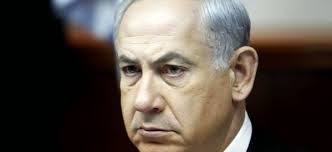
Israel’s prime minister is now also its defense minister—but he’s mostly interested in the job for PR.
On Tuesday morning, Israelis woke up to the news that their army had embarked on a major operation on the border with Lebanon. Mechanized diggers had begun work near the northern town of Metula, and within hours a tunnel, 80 feet underground, was exposed. Military spokesmen were on hand to provide extensive briefings on how the Lebanese Shiite militia Hezbollah had planned to use cross-border tunnels to launch a surprise attack on Israeli citizens in Galilee.
The development wasn’t entirely surprising. Israel has been waging an ongoing campaign against the threat of “attack tunnels” on its borders with Lebanon and the Gaza Strip for years. Physically digging up and destroying the northern tunnels marks a new stage, but hardly a new operation. So the media fanfare surrounding “Operation Northern Shield” seemed to many security officials overblown. Many assume the branding and public relations have less to do with Hezbollah than with Israel’s new defense minister, who just happens also to be its prime minister.
One of his early decisions was to end their participation in the negotiations, and at cabinet meetings, which had been routinely attended by the IDF chief of staff and other senior generals, he ordered them to leave once their briefings were over. This irked the charismatic chief of staff, Lt. Gen. Amnon Lipkin-Shahak, a favorite of Rabin’s, who was told by Netanyahu that “it isn’t the chief of staff’s role to provide political analyses.” Details of the clashes between Netanyahu and the generals swiftly found their way to the press, further exacerbating tensions.
In 1999, when Netanyahu lost the election to another former IDF chief of staff, Ehud Barak, who had also been close to Rabin, it was seen by many as the army’s revenge. Barak’s campaign team was composed largely of former special-forces officers who volunteered to help bring down Netanyahu. And when Netanyahu returned to office a decade later, military officers did everything in their power to obstruct Netanyahu’s plans to attack Iran’s nuclear program, in some cases clashing openly in meetings when the prime minister pushed to have the army put on a war footing.
The most pressing question arising from Netanyahu’s decision to keep the defense portfolio is whether it could signal a more aggressive Israeli security policy. In previous Israeli cabinets, the defense minister has often led the calls for military operations, while the prime minister has acted as a brake. When the same man fills both positions, that dynamic can change. Most cross-border operations carried out by Israeli forces need to be approved by the prime minister and defense minister. Now one less signature is needed.
One argument against Netanyahu imposing a tougher defense policy is that as prime minister, he has never seemed inclined to launch wars. Of Israel’s elected leaders, Netanyahu has on average the lowest annual casualty rate. This of course shouldn’t be ascribed to any will on his part to make peace—his ideological position is to obstruct any concessions to the Palestinians—but to his risk-averseness and awareness that wars with large numbers of troops on the ground are nearly impossible to control. Netanyahu has always had a penchant for secret missions carried out by elite special units, such as the one he was a member of, and by the air force. These are much easier to control than wars.
In his thirteen years in office, the only military clash that could properly be called a war was the Gaza offensive in the summer of 2014. Even then, Netanyahu was dragged into authorizing a ground campaign by the generals and his cabinet. While the 50-day Operation Protective Edge was devastating, particularly for the Palestinians, who lost over 2,000 lives, it could have been much worse had Netanyahu not insisted, despite the entreaties of the military commanders, that the forces be allowed to enter Gaza only three kilometers deep.
Gaza is a case in point, as it was the reason for the previous Defense Minister Lieberman’s resignation. Netanyahu may despise Hamas and have no interest in any meaningful negotiations over Gaza’s future, but he was prepared to take criticism from his right-wing base for pushing for a cease-fire, brokered by the Egyptians and paid for by Qatar, which is now providing $15 million in cash each month to pay the salaries of civil servants in Gaza, who are also Hamas members.
This week’s campaign against Hezbollah’s tunnels is also to his liking. Netanyahu was cautious, directing the military spokespeople to constantly repeat that Israel was not seeking an escalation and that the engineering work to uncover and destroy the tunnels was taking place on Israel’s side of the border, not in Lebanese territory. It was all in the service of not giving Hezbollah an excuse to retaliate.
Netanyahu should take heed of the fate of his predecessors who served as defense minister as well. Ben-Gurion resigned in 1963, his political standing damaged by a spying and sabotage mission authorized by rogue elements in the security establishment. Levi Eshkol was forced to give up the defense ministry on the eve of the Six-Day War in 1967, amid a political coup in reaction to what was seen as Eshkol’s hesitancy in giving the order to attack.
Rabin, who was both prime minister and defense minister, was murdered by a Jewish fanatic. Peres, who succeeded Rabin in both roles, received much of the blame for a wave of suicide attacks that led to his losing the 1996 election to Netanyahu. Barak, the last man to hold both roles, was similarly blamed by the Israeli public for the Second Intifada and further suicide attacks, and ended up Israel’s shortest-serving prime minister.
Netanyahu hopes that the glamour of the military will boost his prospects in the upcoming election. But he may live to regret the decision.
Foreign Policy

Leave a Reply
You must be logged in to post a comment.